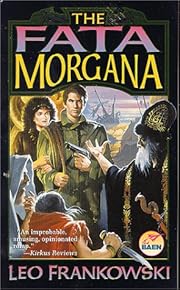

Auf ein Miniaturbild klicken, um zu Google Books zu gelangen.
|
Lädt ... The Fata Morgana (Original 1999; 2000. Auflage)von Leo Frankowski
Werk-InformationenThe Fata Morgana von Leo Frankowski (1999)
 Keine Keine aktuelle Diskussion zu diesem Buch. keine Rezensionen | Rezension hinzufügen
Two skeptical, modern engineers find their lives turned upside down when they accidentally stumble upon the legendary Western Isles, the mythical home of King Arthur's father, Uther Pendragon. Keine Bibliotheksbeschreibungen gefunden. |
Aktuelle DiskussionenKeineBeliebte Umschlagbilder
 Google Books — Lädt ... Google Books — Lädt ...GenresMelvil Decimal System (DDC)813.54Literature English (North America) American fiction 20th Century 1945-1999Klassifikation der Library of Congress [LCC] (USA)BewertungDurchschnitt: (3.64) (3.64)
Bist das du?Werde ein LibraryThing-Autor. |
||||||||||||||||||||||||||||||||||||||||||||||||||||||||||||||||||||||||||||||||||||||||||||||||||||||||||||||||||||||||||||||||||||||
The book concerns itself with the island's unique social structure and technology, and how these are influenced by the special situation and environmental conditions the islanders find themselves in. The author describes the parallelities and differences of the islanders' culture to western society, mostly from the perspective of the main protagonist. The dynamics between secular government, religious institutions and science are also within the scope of the book, as well as the relation between "magic" and science.
While the book is not thrilling or exciting for the most part, I have found it very interesting. The culture and technology of the islanders, altough fictional, is plausible and well explained. I have found the exploration of how culture and technology are influenced by the requirements of a people's environment to be the distinctive feature of the book.
Most reviews here argue that the author uses the book to dictate his own views on the world to the reader, often in a very "my-opinion-is-correct-and-your's-is-wrong" sort of way. While such passages exist (which I, too, found irritating), it should be noted that because the book is written in the first person, any of the described trains of thought reflect views of the narrator/protagonist, and can only indirectly be said to reflect the opinion the author, which I think is the wrong interpretation here (see spoiler).
The main character often argues that all opinions, views, thoughts and actions of a person are caused by that persons perception of the world and are thus only sensible/valid within this persons personal "bubble". He observes that people often build walls within their minds and refuse to think about (or even to acknowledge) certain issues, so to keep their own personal views (seemingly) consistent with the world.
On the very last pages of the book, the protagonist learns that this also applies to himself.
I think that the often criticised "opinion-passages" are a means of emphasising this point, as they identify the protagonist as a very opinionated character, who is in the end confronted with his own hippocricy, when he comes to realise that he is not better suited to analyse and evaluate the world than others.
My major point of critique on this novel is that the author often resort to simply explaining many of the aspects of the island's society (in the form of an explanation by a character in the book or the narrator himself), instead of showing the the island and having the reader figure it out (See: Show, don't tell). This may be appropriate, as it is only a short book, but then again, maybe it should have been longer. (